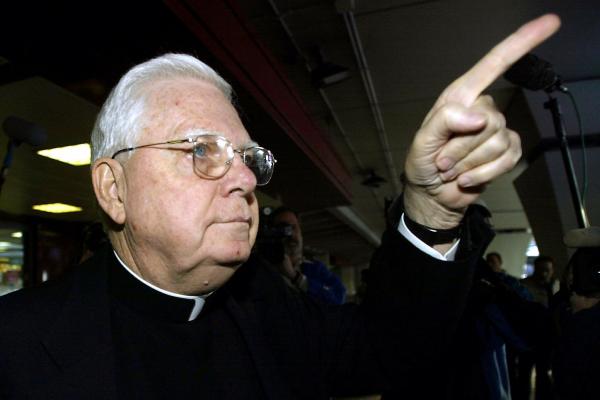When a leading cardinal in the Catholic church dies, his legacy of caring for priests and believers are usually the highlights of remembrances.
Not so with Cardinal Bernard Law, driven out in disgrace as Archbishop of Boston in 2002. His priests and his people had demanded he step down after a year of painful revelations that the diocese had known about — and sheltered — scores of priests who sexually abused children and teens.
After Law died Dec. 20, his successor, Cardinal Sean O’Malley, issued a statement that began with an apology to “ … all who experienced the trauma of sexual abuse by clergy, whose lives were so seriously impacted by those crimes, and their families and loved ones.”
O’Malley offered them his “sincere apologies,” and continued prayer and support for healing, before turning again to the tragic legacy of Law, putting him in the context of a wider church failure.
“As Archbishop of Boston, Cardinal Law served at a time when the Church failed seriously in its responsibilities to provide pastoral care for her people, and with tragic outcomes failed to care for the children of our parish communities. I deeply regret that reality and its consequences….”
Cardinal Daniel DiNardo, president of the U.S. Conference of Catholic Bishops, went directly to the same point, beginning his statement by urging any victim today to contact both their church and their local law enforcement.
“As we reflect on the legacy of Cardinal Law, it will likely bring back painful memories for survivors. The Church seeks to always respond as supportive pastors,” DiNardo said. Even as he offered “prayers and condolences to the family and friends of Cardinal Law,” he prayed for the survivors of abuse to find “strength and peace in the mercy of Christ.”
Victims are unforgiving — of Law and the church.
Barbara Dorris, executive director for SNAP — Survivors Network of those Abused by Priests — told the Boston Herald that their anger has not subsided in the years since the scandal exploded.
Law, the first famous cardinal to be exposed for leading a cover-up, was not punished by the Vatican, she pointed out. Instead, Law was given comfortable positions in Rome in the wake of his resignation.
"That’s when a lot of survivors got to the point of understanding that church officials appear to feel that they’re above the law. That they’re accountable to no one,” Dorris told the paper. “So Cardinal Law is dead. All we’re doing is changing the names, but the game, if you will, remains the same.”
On SNAP’s web site, western regional leader Joelle Casteix said victims felt doubly betrayed — first by Law’s cover-up of abuse and then by his “promotion to Rome.”
When it comes time for Law’s funeral, Casteix said, “Every single Catholic should ask Pope Francis and the Vatican “why?” Why Law’s life was so celebrated when Boston’s clergy sex abuse survivors suffered so greatly? Why was Law promoted when Boston’s Catholic children were sexually abused, ignored, and pushed aside time and time again?”
Alexa Macpherson, molested as a child by a Boston priest, told the Associated Press, “Cardinal Law was complicit in my hiding abuse.” To the news of his death, she said, “Good riddance to bad rubbish.”
While the headlines focus on Law’s final years in Boston, Rabbi James Rudin, senior inter-religious affairs advisor at the American Jewish Committee, said in a statement that it is also important to recall Law’s early support for civil rights and his global leadership in “building human bridges of mutual understanding and reconciliation between Catholics and Jews.”
Rudin, who worked with Law when the cardinal led the USCCB’s Commission on Ecumenical and Interreligious Affairs, said the prelate “understood the historic significance of the Second Vatican Council’s call in 1965 for a positive change in the Church’s teachings about Jews and Judaism, and he took actions to implement that revolutionary reform.”
Got something to say about what you're reading? We value your feedback!





